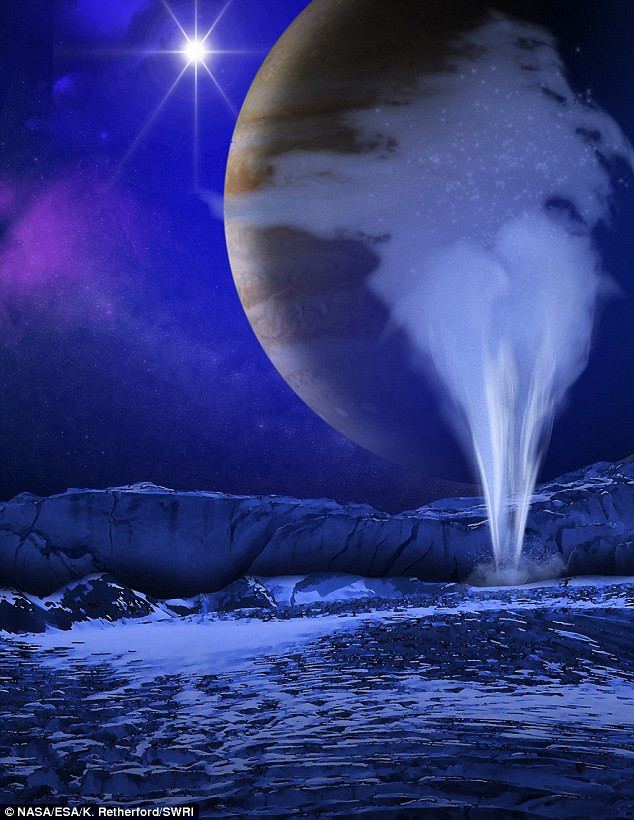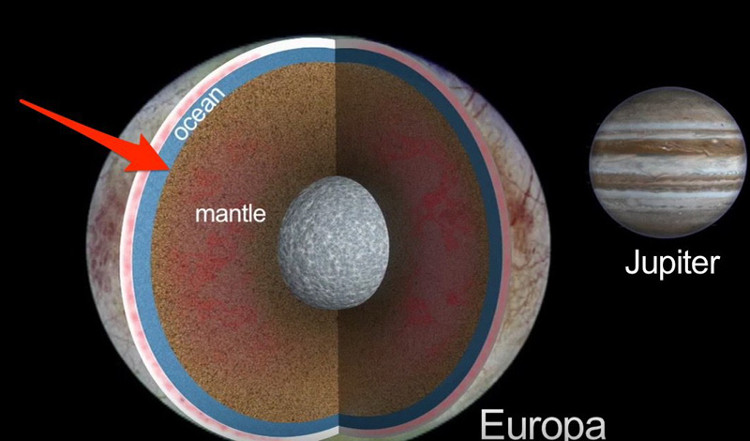NASA holds press conference to announce: Is there life on Jupiter's Moon Europa?
NASA researchers reveal that underneath the ice of the Moon Europa Jupiter may be living an immense ocean, possibly life-giving.
Europa is one of the four largest moons of Jupiter that NASA has been paying attention to for decades.
For a long time, NASA scientists had doubts about the existence of a vast, vast ocean beneath the icy moon of Jupiter Europa. This is a favorable premise as well as a new hope for a planet that can have life.

Scientists have long suspected that beneath the icy moon of the moon Europa Jupiter is a vast ocean.
And the official press conference will take place at 14.00 ET on Monday next (ie around 2 am on Tuesday - September 27) this will reveal a mysterious message - unexpected evidence of the Moon Europa.
This information makes many scientists feel interesting and excited. NASA scientists calculate that the ocean's chemical balance below the 3,100-kilometer-wide moon surface has the potential to produce hydrogen and oxygen similar to Earth.
This ocean may have an environment similar to the environment near the hot water spray pipes in the sea or the environment in Lake Vostok in the Arctic.

When Europa approaches the Jupiter, it stretches into a streamlined shape.When it is far from Jupiter, it shrinks into a sphere.
Europa surface temperature is 110 K (−160 ° C; −260 ° F) at the equator and 50 K (−220 ° C; −370 ° F) at 2 poles, making Europa ice as hard as granite. Life in such an environment would be like the primitive life forms on the seabed on Earth.
NASA is planning to carry out the mission to explore life on the Moon by 2020.
Europa is the sixth satellite, orbiting from inside to outside of Jupiter. Europa was discovered by Galileo Galilei and Simon Marius in 1610.
In his orbit, Europa approaches and moves away from Jupiter to change gravity on it.
As a result, the Moon is constantly squeezed and released like a bubble filled with water, creating cracks and fractures.

Image taken on the surface of Europa - splintered with cracks.
The next press conference will be attended by many large researchers such as:
- Paul Hertz, Director of Astrophysics at NASA headquarters
- William Sparks, an astronomer at the Space Telescope Science Institute in Baltimore
- Britney Schmidt, assistant professor at Earth's schools and Atmospheric Science at Georgia, Atlanta Institute of Technology
- Jennifer Wiseman, senior Hubble project scientist at NASA's Goddard Space Center
The press conference promises to provide the public with the most "shocking" and most interesting information about Europa as well as the results that scientists have gathered in the past.
Jupiter is the fifth planet from the Sun, and is also the largest planet of the solar system. This is a giant gas planet - that is, no solid surface, with a mass of 2.5 times the total mass of all the other planets in the Solar System combined.
Jupiter has many moons - natural satellites revolve around, including 4 big moons: Io, Europa, Ganymede and Callisto . Europa Moon is about 588 million kilometers from Earth (670,900km error). This number is about 1500 times the distance from our Earth to the Moon and to move up here, people will need a trip lasting 13-14 months.
- NASA's dead satellite finds extremely important traces of life on Europa
- NASA is about to announce a new discovery about Jupiter moon tonight
- Result of NASA press conference: Find traces of life on Mars in the past, and may still be present
- The planet promises more life than Mars
- NASA is about to announce a new discovery about life on Mars
- NASA is about to announce new discoveries about extraterrestrial life
- February 23, NASA press conference to announce discoveries outside the Solar System
- How to see NASA's press conference about a huge discovery on the night Mars 7/6/2018 Online
- NASA press conference announced the secret of the solar system
- NASA's Million Dollar Project: Searching for life on Europa
- NASA plans to find alien life near Jupiter
- NASA announces plans to explore Jupiter's Moon
 Vietnam 5th Asian champion on fuel-efficient vehicles
Vietnam 5th Asian champion on fuel-efficient vehicles We can read all NASA studies completely free of charge
We can read all NASA studies completely free of charge Singer and songwriter Bob Dylan won the 2016 Nobel Prize for Literature
Singer and songwriter Bob Dylan won the 2016 Nobel Prize for Literature Scientific revolution in Asia
Scientific revolution in Asia